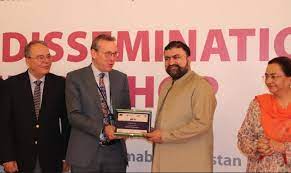EU program transforms lives in Balochistan

Celina Ali
Islamabad: The European Union-funded Balochistan Rural Development and Community Empowerment (BRACE) Programme, a six-year initiative, marked its successful conclusion with a final dissemination workshop organized by the Rural Support Programmes Network.
BRACE, representing the largest EU investment of Euro 45 million in community empowerment within Balochistan, directly impacted 300,000 households across 10 districts.
This EU-funded endeavor was executed through the concerted efforts of the Rural Support Programmes Network (RSPN), Balochistan Rural Support Programme (BRSP), and National Rural Support Programme (NRSP).
Covering one-third of Balochistan, it employed a strategic blend of transactional and transformational approaches to facilitate social mobilization, enhance capacity, and promote civic oversight. The program prioritized empowering vulnerable communities, with a particular emphasis on empowering women.
Under this project, income-generating grants amounting to Rs668 million were disbursed to 13,968 extremely impoverished participants, with 72 percent of them being women. In a commendable outreach effort, the program mobilized 300,000 households, with half of them falling under the economically disadvantaged category.
This initiative forged a cohesive network comprising approximately 26,375 community organizations, 5,739 village organizations, and 237 local support organizations across ten districts: Jhal Magsi, Kech, Khuzdar, Killa Abdullah, Chaman, Loralai, Pishin, Washuk, Duki, and Zhob in Balochistan.
Crucially, this program was implemented in collaboration with the Local Government and Rural Development Department (LGRDD). The final dissemination workshop was presided over by the Federal Minister for Interior, Mir Sarfaraz Bugti, a native of Balochistan.
Jeroen Willems, the Head of Cooperation of the European Union Delegation to Pakistan, reaffirmed the EU’s unwavering commitment to supporting vulnerable communities in Balochistan, who grapple with the adverse effects of climate change, rising inflation, and persistently low human development indicators. These communities have remained at the forefront of the EU’s assistance efforts.
Willems emphasized the EU’s core values of inclusivity, accountability, and sustainability, highlighting the importance of active engagement by local communities, civil society organizations, and marginalized groups in decision-making processes.
He praised the program for its role in strengthening communities, rebuilding essential rural infrastructure, enhancing human capital, and creating livelihood opportunities. Willems also noted that the BRACE Programme had provided Technical & Vocational Education and Training to 3,187 young individuals, with 58 percent of them being women. Impressively, 51 percent of these skilled graduates successfully lifted their families out of poverty.
Zahoorul Hassan Shay, Secretary for the Balochistan Local Government Board, commended the work of RSPN and the implementing RSPs in mobilizing communities. He expressed gratitude to the EU for its continued support in building climate-resilient communities.
Shay pointed out that around 357 community physical infrastructure schemes were benefiting approximately 42,000 families. Improved sanitation and access to clean drinking water had reduced household health expenditures by 50 percent.
He underscored the need for ongoing support to the Balochistan government, particularly in strengthening its local governance systems, following the province’s promulgation of its Community Led Local Governance (CLLG) Policy, which facilitates community engagement in the planning and implementation of development projects at the village level.
